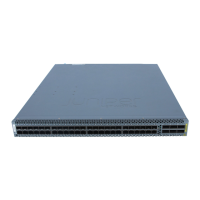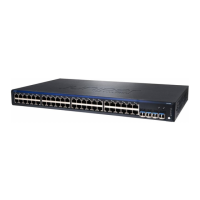Before you begin to calculate the power margin, calculate the power budget. See “Calculating the Fiber-Optic
Cable Power Budget for QFX Series Switches” on page 147.
To calculate the worst-case estimate for the power margin (P
M
) for the link:
1. Determine the maximum value for link loss (LL) by adding estimated values for applicable link-loss
factors; for example, use the sample values for various factors as provided in Table 38 on page 148 (here,
the link is 2 km long and multimode, and the power margin (P
M
) is 13 dBm).
Table 38: Estimated Values for Factors Causing Link Loss
Sample Link Loss Calculation ValuesEstimated Link Loss ValueLink-Loss Factor
0.5 dBmMultimode—0.5 dBmHigher-order mode losses
0 dBmSingle-mode—None
0 dBmMultimode—None, if the sum of
bandwidth and distance is less
than 500 MHz/km
Modal and chromatic
dispersion
0 dBmSingle-mode—None
This example assumes five connectors. Loss for five
connectors: (5)x(0.5 dBm) = 2.5 dBm.
0.5 dBmConnector
This example assumes two splices. Loss for two splices:
2 (0.5 dBm) = 1 dBm.
0.5 dBmSplice
This example assumes the link is 2 km long. Fiber
attenuation for 2 km: 2 km (1 dBm/km) = 2 dBm.
Multimode—1 dBm/kmFiber attenuation
This example assumes the link is 2 km long. Fiber
attenuation for 2 km: 2 km (0.5 dBm/km) = 1 dBm.
Single-mode—0.5 dBm/km
1 dBm1 dBmClock Recovery Module
(CRM)
NOTE: For information about the actual amount of signal loss caused by equipment and
other factors, see your vendor documentation for that equipment.
2. Calculate the (P
M
) by subtracting (LL) from (P
B
):
148

